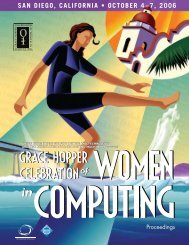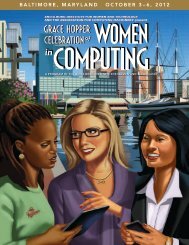ABI-ONE ghc program v14.indd - Grace Hopper Celebration of ...
ABI-ONE ghc program v14.indd - Grace Hopper Celebration of ...
ABI-ONE ghc program v14.indd - Grace Hopper Celebration of ...
You also want an ePaper? Increase the reach of your titles
YUMPU automatically turns print PDFs into web optimized ePapers that Google loves.
GENERAL POSTER SESSION<br />
W e d n e s d ay | s e p T 3 0<br />
A Reinforcement Learning Approach<br />
for Load Balancing in Scientific<br />
Applications Characterized by a Large<br />
Number <strong>of</strong> Time Steps<br />
Presenter: Srishti Srivastava (Mississippi<br />
State University)<br />
For effectively load balancing scientific<br />
applications, a number <strong>of</strong> loop scheduling<br />
algorithms are available; however, selecting<br />
the algorithm that is appropriate for an<br />
application involves guesswork especially<br />
at runtime. Reinforcement Learning (RL)<br />
solves problems via learning, planning and<br />
decision-making. A RL agent following the<br />
model-free learning approach becomes<br />
very useful for automatically selecting the<br />
appropriate load balancing algorithm during<br />
the lifetime <strong>of</strong> the application and learning<br />
using well known techniques like QLEARN<br />
and SARSA.<br />
A Symbiotic, Inter-disciplinary<br />
Collaboration: Mobile Application<br />
Benefits for S<strong>of</strong>tware Development and<br />
Science Courses<br />
Presenter: Sonal Dekhane (Georgia<br />
Gwinnett College)<br />
This poster addresses two problems in<br />
different domains by integrating them<br />
into one interdisciplinary project. The<br />
s<strong>of</strong>tware engineering students have been<br />
“hired” to design and develop a mobile<br />
application to help tutor organic chemistry<br />
concepts by involving multiple avenues <strong>of</strong><br />
learning. By enabling this business relationship<br />
we attempt to provide the s<strong>of</strong>tware<br />
engineering students with authentic<br />
learning experiences and to provide organic<br />
chemistry students with an efficient learning<br />
tool.<br />
A Tangible Query System for Learning<br />
the Structure <strong>of</strong> Amino Acids<br />
Presenter: Promita Chakraborty (Virginia<br />
Polytechnic Institute)<br />
We are building a tangible query<br />
interface to aid in learning the<br />
structure <strong>of</strong> amino acids by school children.<br />
Students would be able to interact with<br />
the system and would learn the chemical<br />
structure <strong>of</strong> amino acids by querying the<br />
system. Teaching school children a topic as<br />
complex as the structure <strong>of</strong> amino acids is a<br />
hard task. A suitable learning model needs<br />
to be designed, and the necessary tools<br />
need to be built.<br />
Accommodating Gender Discrepancies<br />
in the Application <strong>of</strong> the Internet, for a<br />
More Enriching Academic Environment<br />
Presenter: Ritika Jhangiani (College <strong>of</strong><br />
Saint Scholastica)<br />
The goal <strong>of</strong> this study is to identify if there<br />
exists a gender difference among college<br />
level students with respect to how they use<br />
the internet and their attitude and comfort<br />
level towards using it. This information could<br />
provide valuable guidelines for teachers<br />
towards tailoring the use <strong>of</strong> the internet, in<br />
order to provide a more satisfying learning<br />
experience for male and female college<br />
students.<br />
Adaptive Binarization Method with<br />
Variable Window Size<br />
Presenter: Alexandra Olteanu (University<br />
“Politehnica” <strong>of</strong> Bucharest)<br />
Document image binarization is the step<br />
at the base <strong>of</strong> every content conversion<br />
system and requires maximum quality for<br />
the output, since it affects all subsequent<br />
processing steps. Our method aims to<br />
overcome a series <strong>of</strong> problems that global<br />
binarization algorithms cannot treat and<br />
to bring a significant improvement to local<br />
binarization methods, such as Niblack’s, by<br />
using a variable window size.<br />
Adaptive Scheduling Approach Used<br />
for Rescheduling in Large Scale<br />
Distributed Systems<br />
Presenter: Alexandra Olteanu (University<br />
“Politehnica” <strong>of</strong> Bucharest)<br />
Fault tolerance is an important issue<br />
which is studied in the context <strong>of</strong> Large<br />
Scale Distributed Systems (LSDS). The<br />
proposed fault tolerant solution for resource<br />
management in LSDS combines an adaptive<br />
scheduling approach that selects the most<br />
appropriate scheduling algorithm depending<br />
on the application type and the set <strong>of</strong><br />
available resources, and a generic rescheduling<br />
algorithm that supports a large variety<br />
<strong>of</strong> scheduling heuristics which are chosen in<br />
advance.<br />
Alice Franchise - An Exploration <strong>of</strong><br />
Storytelling Alice, Alice 2.x, and<br />
Alice 3.0<br />
Presenter: So Phi A Ngo (Roger Williams<br />
University)<br />
Alice Franchise poster shows the varied<br />
Alice <strong>program</strong>ming environments,<br />
developed at Carnegie Mellon University. It<br />
explicates the differences between Storytelling<br />
Alice, designed for middle school,<br />
Alice 2.x, designed for high school/preCS1,<br />
and Alice 3 (Beta), designed for CS1 and as<br />
a to bridge to Java. The poster session will<br />
include examples <strong>of</strong> implementation <strong>of</strong> each<br />
<strong>program</strong>, especially for outreach, with an<br />
emphasis on introductory <strong>program</strong>ming in a<br />
media rich environment.<br />
Amazon Mechanical Turk: A Method<br />
for Multi-National Collaboration for<br />
The Purpose <strong>of</strong> Discovering Foreign<br />
Language Nicknames<br />
Presenter: Elizabeth McGrath (MITRE)<br />
This research considers if crowdsourcing<br />
via Amazon’s Mechanical Turk (Mturk)<br />
labor market could be used effectively to<br />
discover Arabic nicknames. According to a<br />
U.S. government report, the Christmas day<br />
Anita Borg Institute for Women and Technology | <strong>Grace</strong> <strong>Hopper</strong> <strong>Celebration</strong> <strong>of</strong> Women in Computing 47




